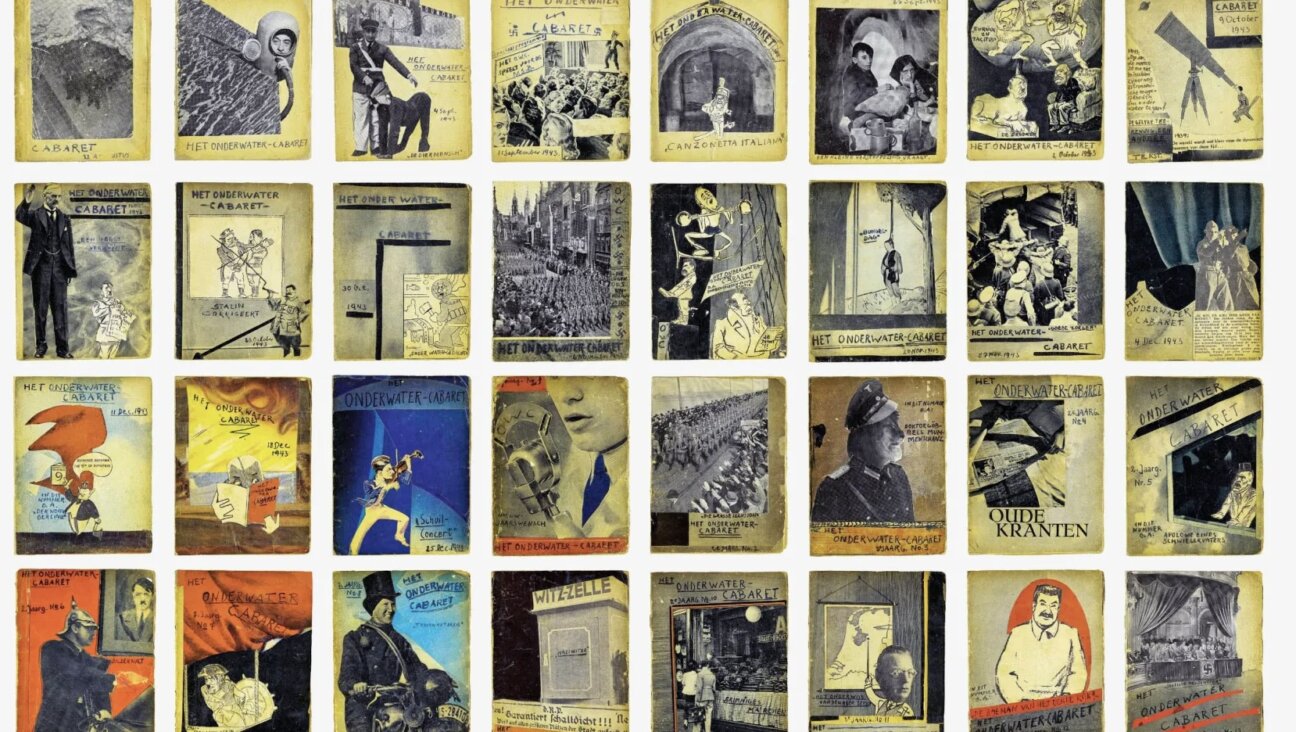Being Where He Deserves To Be

Graphic by Angelie Zaslavsky
Multiple exile was the singular experience of 20th-century Jewish musicians. Fleeing from fascist Europe, Soviet oppression and war, they sought audiences capable of giving them shelter and appreciating their talents. A key example is Vienna-born conductor and composer Georg Tintner, who worked in quasi-obscurity in New Zealand, Australia and Canada until late in life, when he was permitted to record Bruckner’s symphonies for Naxos, by which time he was already elderly and suffering from cancer. As an “honorable” way to escape this disease, as Tintner put it, he committed suicide in 1999, at age 82.
Tintner is mostly remembered for his Bruckner CDs and, as one 1984 critic put it, for giving the appearance in concert of a “slightly underfed Old Testament prophet castigating the doubters of his congregation.” Last April, a brilliant new biography, “Out of Time: The Vexed Life of Georg Tintner,” appeared, almost entirely unheralded, from University of Western Australia Press (and available in America from International Specialized Book Services), patiently explaining the sources of Tintner’s artistry.
Written by the conductor’s widow, Tanya Buchdahl Tintner, a journalist and arts administrator, “Out of Time” narrates the musician’s trajectory, starting in Vienna, where he was the first Jewish boy to be admitted to the noted Wiener Sängerknaben (Vienna Boys Choir). On a 1929 tour of Italy, at an audience with Pope Pius XI, Tintner was the only choirboy who refused to kiss the pope’s ring. This may have exacerbated the first “vexed” aspect of Tintner’s life. Wiener Sängerknaben’s director, Josef Schnitt, was a notorious anti-Semite who tormented young Tintner in public, informing assemblies during prize-giving ceremonies: “And of course, there is nothing for the Jew.” Paradoxically, Schnitt eventually was fired for not being enough of a Nazi, leading Tintner to marvel during a 1983 interview: “[Schnitt’s] anti-Semitism, which ruined and poisoned my childhood, would have been worthy” of the Nazis and was “perhaps more virulent than” his eventual Nazi-approved successor, conductor Georg Gruber.
This early torment unsettled Tintner to the point where, at age 14, he would stand in the street outside the Vienna home of Sigmund Freud — “even in the rain,” Tanya Tintner recounts — hoping to catch a healing glimpse of the founder of psychoanalysis. Tintner was permanently affected by his early contact with anti-Semitism, which may have played a role in later musical choices. In 1970s lectures to Canadian music students, Tintner explained how he was repelled by the “self-pity,” “self-hatred” and “self-loathing” that he discerned in much of Mahler’s music. By contrast, Tintner loved Austrian-Catholic composer Anton Bruckner’s music for its “consolation” and “assurance,” adding his admiration for “that sort of cosmic feeling that, in spite of every horrible thing, the world can be a good place.”
“Out of Time” underlines that, despite life and career vexations aplenty, Tintner did find such consolations in music. One Naxos CD from a 12-CD Naxos Tintner Memorial Edition features, among other pieces, buoyant works by two Australian-Jewish composers: “Serenade for Small Orchestra” by Berlin-born George Dreyfus, alongside “North American Square Dance Suite” by Arthur Benjamin. Tintner’s own experience as an exile is reflected in his eloquent conducting on a posthumously released CD from ABC Classics of “There Is an Island” by Tasmanian-born Don Kay. This cantata for children’s choir and orchestra presents the encounter between an 18th-century British convict and indigenous Aborigines. Tintner’s own dislocation doubtless added resonance to this meeting between locals and displaced persons.
Tintner championed many other works, usually in remote concert venues, that he never got the chance to record, such as “The Emperor of Atlantis” by Viktor Ullmann, an opera written in 1943 at the Terezín concentration camp. Tintner performed it across Canada in the 1970s, in such places as Antigonish and Wolfville, Nova Scotia. He also championed, but did not record, “From the Diary of Anne Frank,” a moving 1970 work for soprano and orchestra by Canadian composer Oskar Morawetz.
Yet what Tintner did manage to record (mostly available in the uneven, but welcome, Tintner Memorial Edition) includes some lovely surprises, such as a spiffy performance of arrangements for brass instruments of symphonic works by Beethoven from Philips CDs. On another Naxos CD of Mozart’s dances and marches, Tintner manages to inspire Symphony Nova Scotia to play with charm. Scrappy recording conditions, underwhelming ensemble playing and other problems keep other Tintner CDs from being genuinely representative of his talents.
Also hindering his career progress was what some writers euphemistically describe as “eccentricities.” While his wife as biographer is preternaturally tolerant, even when her own feelings were clearly wounded, “Out of Time” details in full Tintner’s vehemently extreme views as a pacifist, socialist and vegan. He adopted this diet around 1954, apparently as an evolving reaction to the carnage of World War II, as well as to his own ill-fated postwar stint as a poultry farmer in New Zealand. In 1975, when mocked in The Australian newspaper for his vegan beliefs, Tintner wrote to the editor: “I have never tried to prevent others from eating corpses and therefore have the right to be spared untrue stories about my more humane diet.” Repeated accounts of Tintner’s affection for all living creatures — including cockroaches, mice and rats, which invaded his living space — go beyond what is generally considered eccentricity, and indeed on one occasion provided legal grounds for divorce from one of his two previous wives.
Despite such idiosyncrasies, the overall impression of Tintner in “Out of Time” is one of lovability, which is why the book’s preface by Australian conductor Richard Gill, calling Tintner a “musical Diogenes,” seems off-key. Diogenes, the Greek co-founder of Cynic philosophy, went out of his way to shock and awe others, deliberately performing stunts to mock and annoy. By contrast, Tintner, even though sometimes treated appallingly by vastly inferior talents, was of gentle, polite demeanor and thus was most often unintentionally provocative.
On one such occasion in 1965, the mediocre conductor Richard Bonynge, mostly famous for being soprano Joan Sutherland’s husband, banished Tintner to work as assistant prompter at The New Zealand Opera. Bonynge’s blank incomprehension of Tintner’s musical stature, as opposed to irritation at his eccentricities, may have been the reason for this indignity. Tintner wrote with delicately poignant forbearance to the opera administrator:
Forgive me for making the personal observation that I see the years slip by (I was forty-seven in May) and I am being de- instead of promoted. Hitler cost me fifteen years of my life and I see less talented and younger people leaving me behind. I don’t think many people who have conducted seventeen different operas from memory (not to speak of many symphonies etc.) have been used as prompters. Nevertheless the Hindus say: We are where we deserve to be — perhaps they are right.
Tintner’s remarkable endurance and forbearance has finally been rewarded by posterity. On a 2007 CD, “Tintner the Composer” from Naxos, the sublime violinist Cho-Liang Lin paid tribute to Tintner’s creative gifts with a quicksilver performance of his violin sonata, a piece that in 1951 had been flatly rejected by Yehudi Menuhin. Against all odds, enough of a recorded legacy remains to genuinely esteem Tintner’s highly individual talent.
Benjamin Ivry is a frequent contributor to the Forward.
Listen to an excerpt of Tintner leading a sweeping performance of Bruckner’s Third Symphony.
Listen to Tintner affectionately conducting a piano concerto by Australian/New Zealand composer Alfred Hill.
















